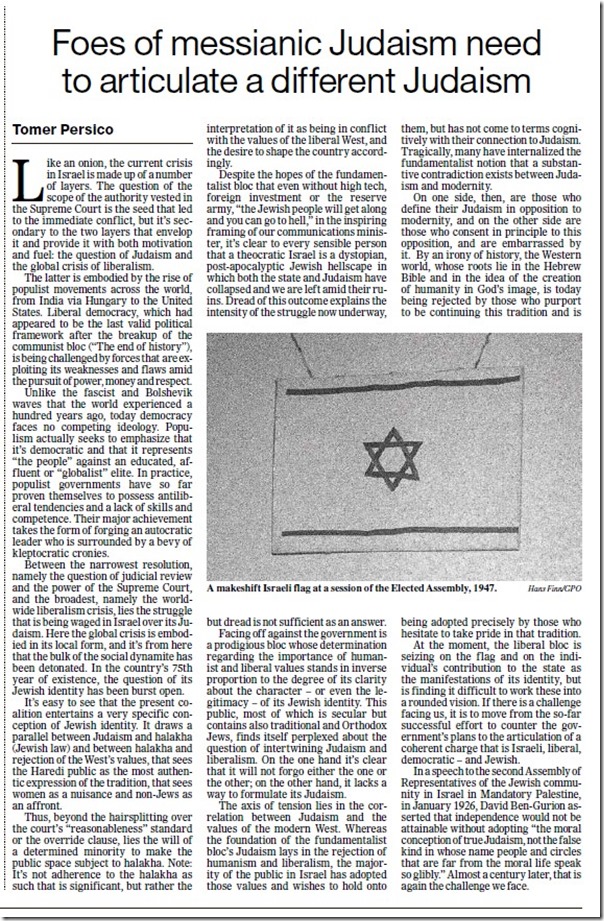Like an onion, the current crisis in Israel is made up of a number of layers. The question of the scope of the authority vested in the Supreme Court is the seed that led to the immediate conflict, but it’s secondary to the two layers that envelop it and provide it with both motivation and fuel: the question of Judaism and the global crisis of liberalism.
The latter is embodied by the rise of populist movements across the world, from India via Hungary to the United States. Liberal democracy, which had appeared to be the last valid political framework after the breakup of the communist bloc (“The end of history”), is being challenged by forces that are exploiting its weaknesses and flaws amid the pursuit of power, money and respect.
Unlike the fascist and Bolshevik waves that the world experienced a hundred years ago, today democracy faces no competing ideology. Populism actually seeks to emphasize that it’s democratic and that it represents “the people” against an educated, affluent or “globalist” elite. In practice, populist governments have so far proven themselves to possess antiliberal tendencies and a lack of skills and competence. Their major achievement takes the form of forging an autocratic leader who is surrounded by a bevy of kleptocratic cronies.
Between the narrowest resolution, namely the question of judicial review and the power of the Supreme Court, and the broadest, namely the worldwide liberalism crisis, lies the struggle that is being waged in Israel over its Judaism.
Here the global crisis is embodied in its local form, and it’s from here that the bulk of the social dynamite has been detonated. In the country’s 75th year of existence, the question of its Jewish identity has been burst open.
It’s easy to see that the present coalition entertains a very specific conception of Jewish identity. It draws a parallel between Judaism and halakha (Jewish law) and between halakha and rejection of the West’s values, that sees the Haredi public as the most authentic expression of the tradition, that sees women as a nuisance and non-Jews as an affront.
Thus, beyond the hairsplitting over the court’s “reasonableness” standard or the override clause, lies the will of a determined minority to make the public space subject to halakha. Note: It’s not adherence to the halakha as such that is significant, but rather the interpretation of it as being in conflict with the values of the liberal West, and the desire to shape the country accordingly.
Despite the hopes of the fundamentalist bloc that even without high tech, foreign investment or the reserve army, “the Jewish people will get along and you can go to hell,” in the inspiring framing of our communications minister, it’s clear to every sensible person that a theocratic Israel is a dystopian, post-apocalyptic Jewish hellscape in which both the state and Judaism have collapsed and we are left amid their ruins.
Dread of this outcome explains the intensity of the struggle now underway, but dread is not sufficient as an answer. Facing off against the government is a prodigious bloc whose determination regarding the importance of humanist and liberal values stands in inverse proportion to the degree of its clarity about the character – or even the legitimacy – of its Jewish identity.
This public, most of which is secular but contains also traditional and Orthodox Jews, finds itself perplexed about the question of intertwining Judaism and liberalism. On the one hand it’s clear that it will not forgo either the one or the other; on the other hand, it lacks a way to formulate its Judaism.
The axis of tension lies in the correlation between Judaism and the values of the modern West. Whereas the foundation of the fundamentalist bloc’s Judaism lays in the rejection of humanism and liberalism, the majority of the public in Israel has adopted those values and wishes to hold onto them, but has not come to terms cognitively with their connection to Judaism.
Tragically, many have internalized the fundamentalist notion that a substantive contradiction exists between Judaism and modernity. On one side, then, are those who define their Judaism in opposition to modernity, and on the other side are those who consent in principle to this opposition, and are embarrassed by it.
By an irony of history, the Western world, whose roots lie in the Hebrew Bible and in the idea of the creation of humanity in God’s image, is today being rejected by those who purport to be continuing this tradition and is being adopted precisely by those who hesitate to take pride in that tradition.
At the moment, the liberal bloc is seizing on the flag and on the individual’s contribution to the state as the manifestations of its identity, but is finding it difficult to work these into a rounded vision. If there is a challenge facing us, it is to move from the so-far successful effort to counter the government’s plans to the articulation of a coherent charge that is Israeli, liberal, democratic – and Jewish.
In a speech to the second Assembly of Representatives of the Jewish community in Israel in Mandatory Palestine, in January 1926, David Ben-Gurion asserted that independence would not be attainable without adopting “the moral conception of true Judaism, not the false kind in whose name people and circles that are far from the moral life speak so glibly.” Almost a century later, that is again the challenge we face.



I agree with this 100%… But the lack of such a vision is, of course, nothing new. Do you have any suggestions for this camp towards identifying and uniting behind such a charge?
~David